Some significative letters of the Flo Menezes' archives
Among the great masters of New Music, specially those who mostly influenced my compositional aesthetics, I had intense contact with, in my opinion, the most important of them: Luciano Berio, Karlheinz Stockhausen, Henri Pousseur and Pierre Boulez.
In my personal archives, there are many significant letters written by these masters to me, in which many aspects of composition were discussed: around 10 letters from Berio, 26 from Stockhausen (many of them with more than one page), 3 from Boulez and 34 from Pousseur (with whom I had many email correspondences until his death in 2009), besides books and scores with personal dedication.
From Stockhausen, for instance, whose home in Kürten I visited twice (respectively on 9 July 1999 and on 3 July 2001 – I was invited by Stockhausen to be the Analysis Professor of his Courses in both years), I received as gift with personal, warm dedication no less than around 31 scores and many CDs.
For possible musicological purposes, a small part of these correspondences is reproduced below.
Flo Menezes
Luciano Berio
A special letter from Berio (from 20 September 1991) written to me when I was living in Italy and telling me that he wrote personally to Paul Sacher in Basle, asking him to give me a scholarship in order to allow me to develop researches on his manuscripts at the Paul Sacher Foundation, where I spent four months in 1992:
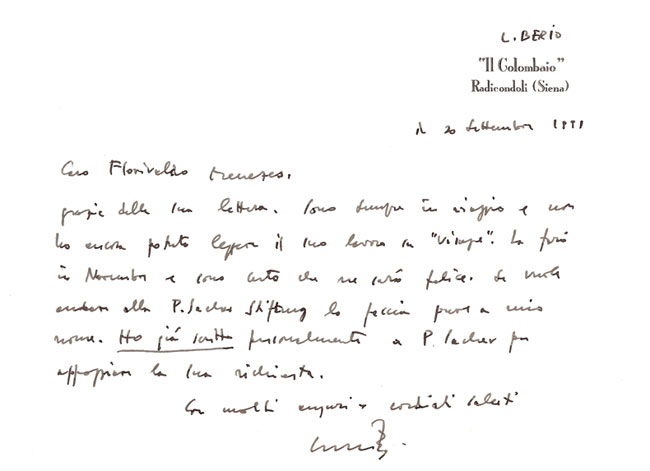
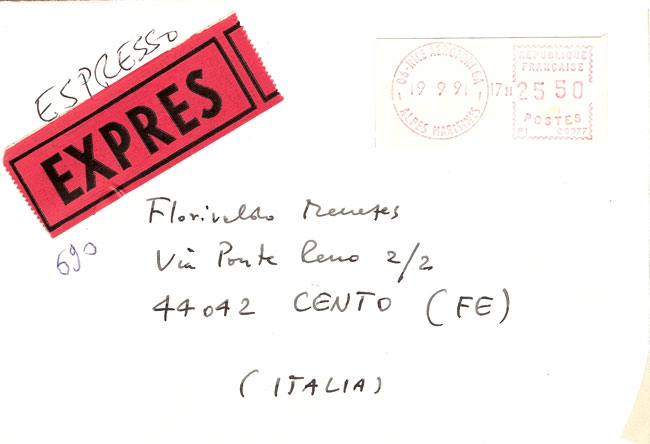
A later letter (31 May 1995) in which Berio explained me the reason of not having answered immediately to one of my letters to him:
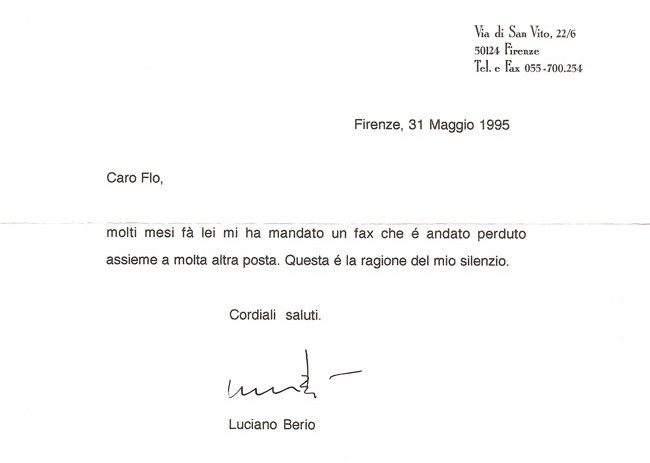
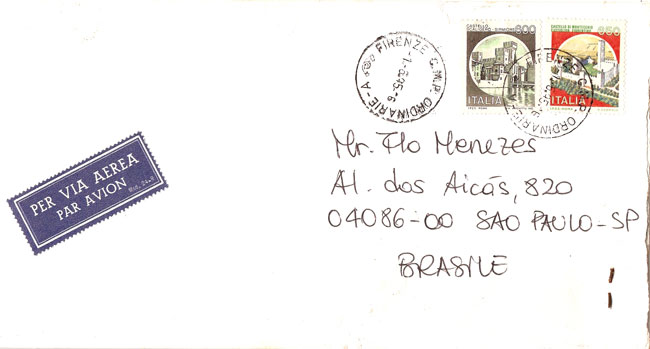
A special letter of Berio from 5 March 1997: on 25 February 1997 I was invited by the GRM in Paris to do a concert together with Berio at the Salle Olivier Messiaen with the Acousmonium loudspeaker orchestra. My Parcours de l'Entité was played and, from Berio, his Chants Parallèles. Some days after this concert, Berio wrote me this letter praising my piece and encouraging me to develop compositional researches with live-electronics. This letter motivated me to explain him why the focus of my mixed works was still, at that time, mostly centered on the usage of tapes, as shown in my following letter to him:
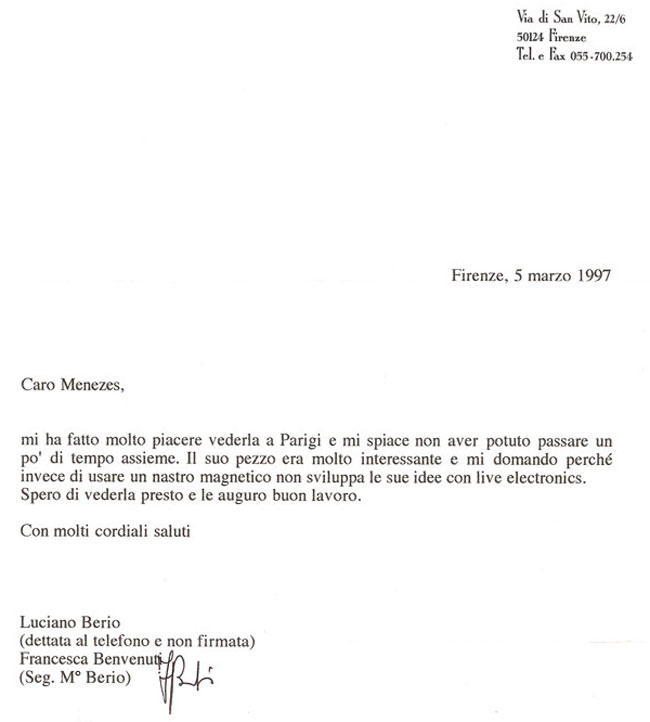
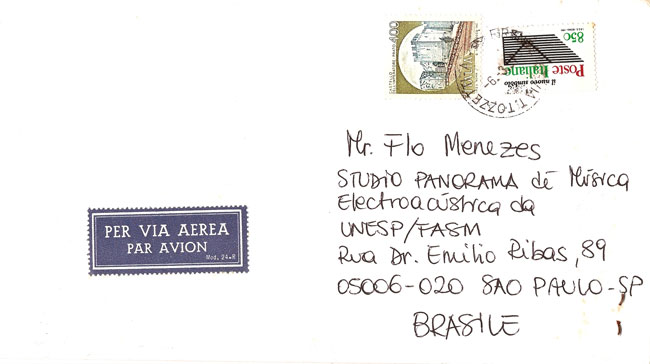
My answer from 2 April 1997 to this letter of Berio:
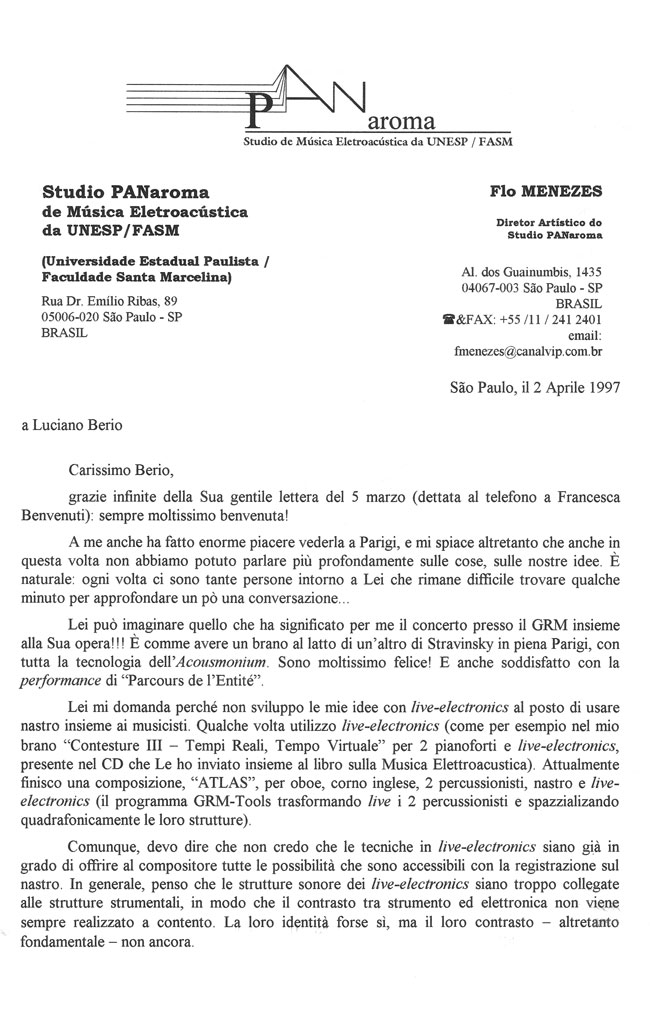
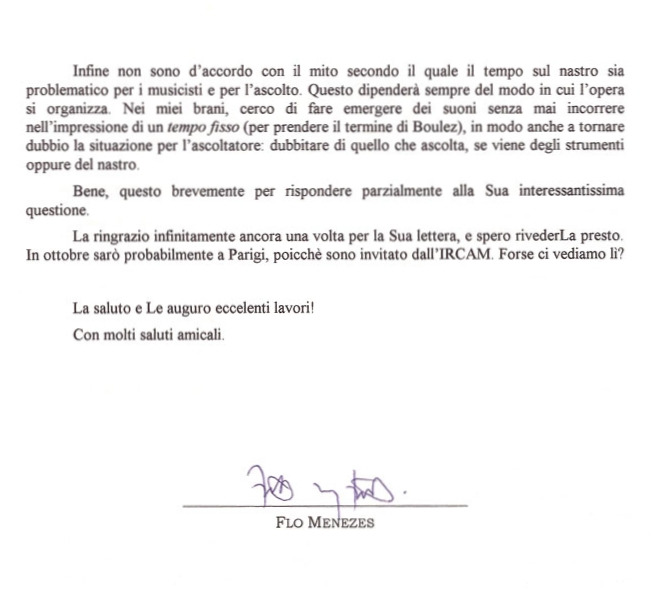
Karlheinz Stockhausen
In this following letter from Stockhausen (from 9 June 1997, which came together with CD and score of Welt-Parlament), after reporting me about a new piece (Klavierstück XVI), he told me gently that I could ask him to send me scores if I needed to. In fact, in the following years Stockhausen sent me countless scores with warm dedications:
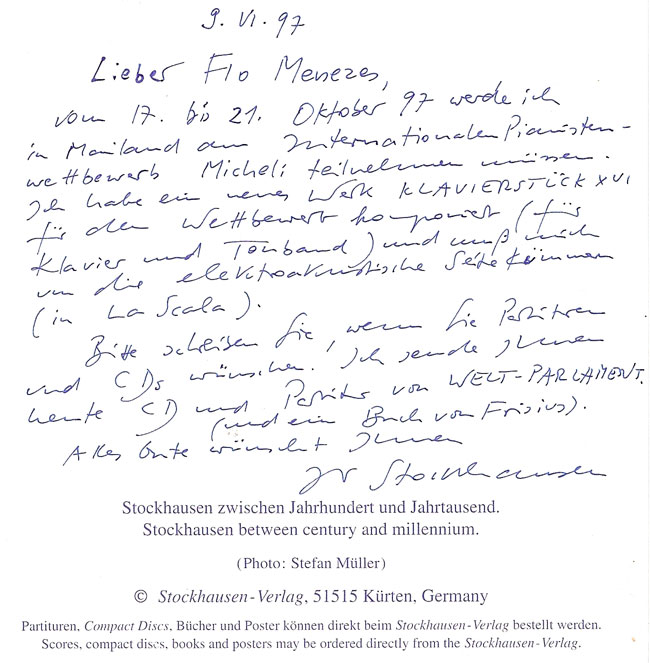
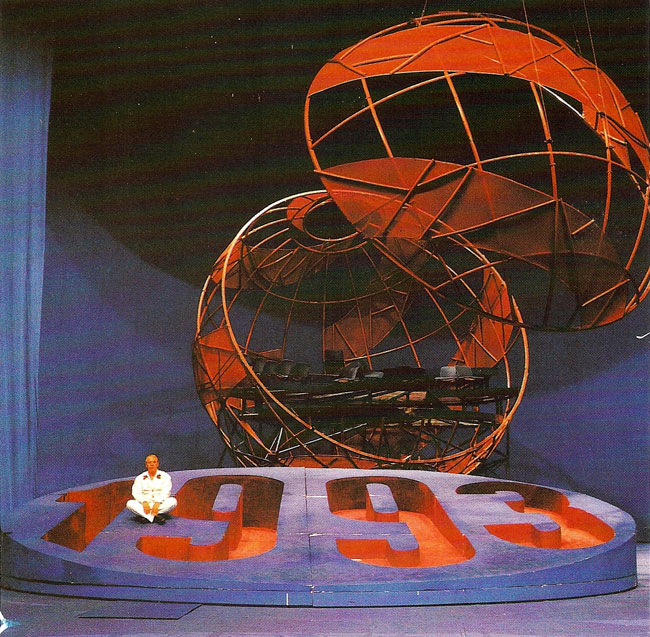
A rare letter (from 4 September 2000) of Stockhausen: since it was not possible to me to go as Professor to his Stockhausen-Courses in 2000 (as I made in 1999), he wrote to me praising my qualities (he writes about my "spiritual joy", my "musical knowledge", my "politeness"), telling me that he missed me there. I could still be once in Kürten to give the Analysis Course in 2001:
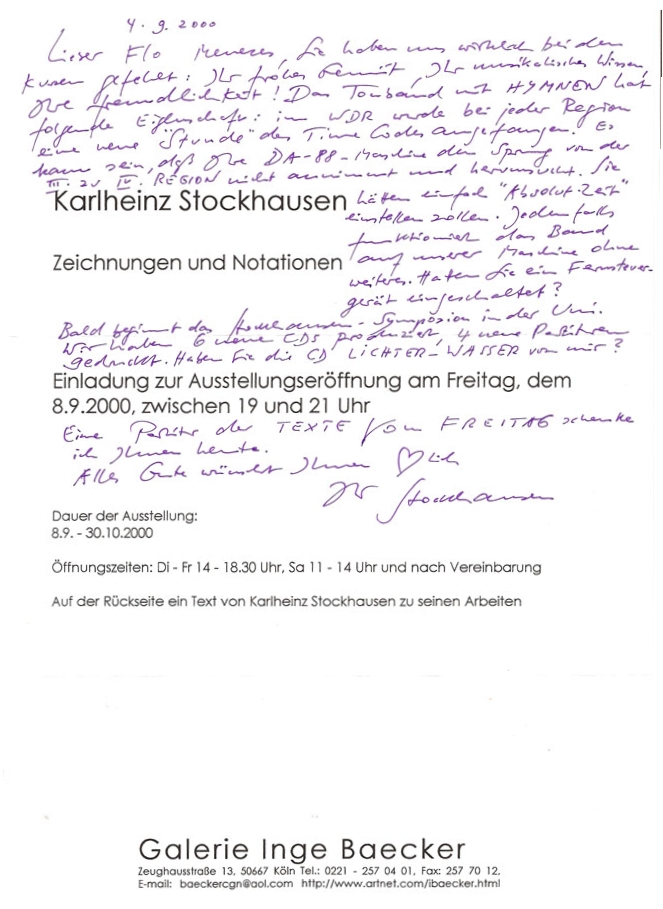
Henri Pousseur
In the following letter from 16 January 1988, written in the back of the program of a Pierrot Lunaire performance given by his daughters, Pousseur congratulates me for the born of my first son Murilo in Cologne (in December 1987):
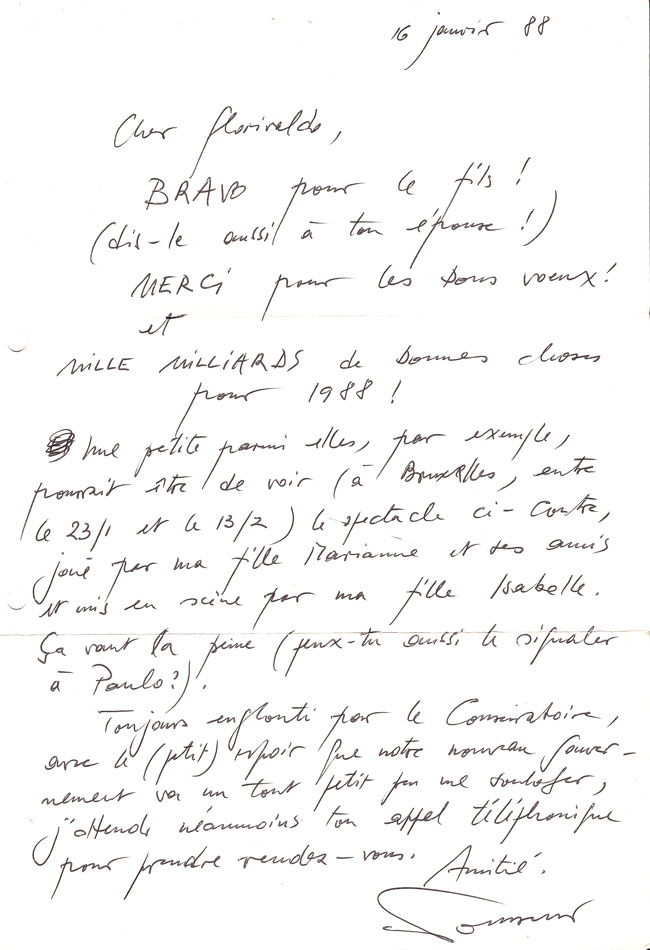
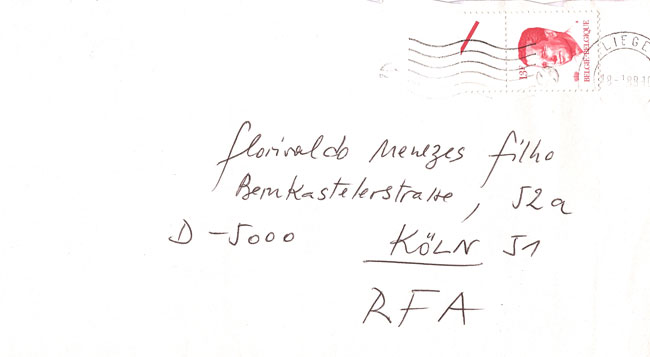

In the following postcard from 19 May 1989, Pousseur praises my piece Profils Écartelés (1988) for piano and tape – written to his 60th birthday in 1989 –, sending me a wonderful poem by Michel Butor (see my transcription below):
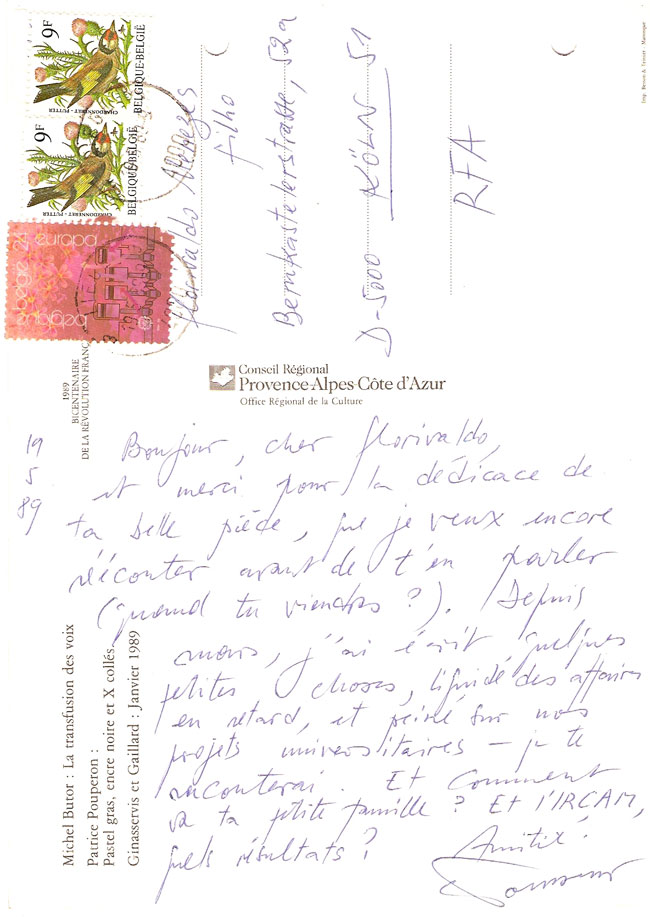
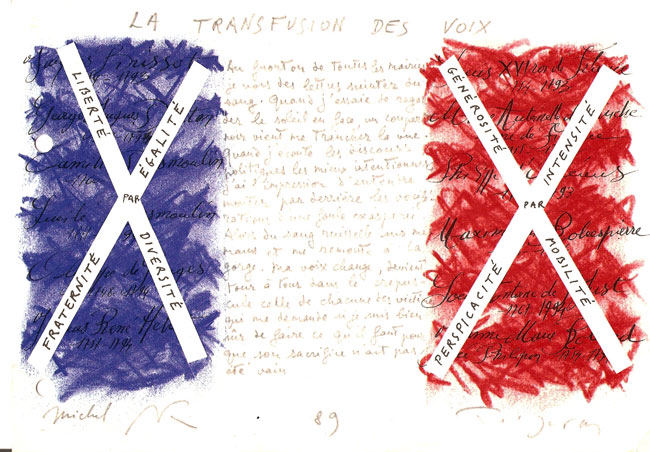
Transcription of the poem:
"La Transfusion des Voix –
Au fronton de toutes les mairies je vois les lettres suinter du sang. Quand j’essai de regarder le soleil en face, un couperet noir vient me trancher la vue. Quand j’écoute les discours politiques les mieux intentionnés, j’ai l’impression d’entendre monter par derrière les vociférations d’une foule exaspérée. Alors du sang ruisselle sur mes mains et me remonte à la gorge. Ma voix change, devient tour à tour dans le crépuscule celle de chacune des victimes qui me demande si je suis bien sûr de faire ce qu’il faut pour que son sacrifice n’ait pas été vain".
On 28 December 1996 Pousseur wrote me a specially interesting letter: praising my pieces of the 1990ties by their "technical and exemplary perfection", their "acoustical aspect (including the instrumental writing)" and their "immediate beauty", he criticized me to be to strongly attached by the sonorities of the 1950ties and 1960ties, telling me that his music on that time was a possible new solution for the future. Even if I could agree with the inestimable value of his works, and although he praised my compositional qualities, I did not agree with him in what concerned his view... and I wrote him, tow years later (!), my answer (see below):
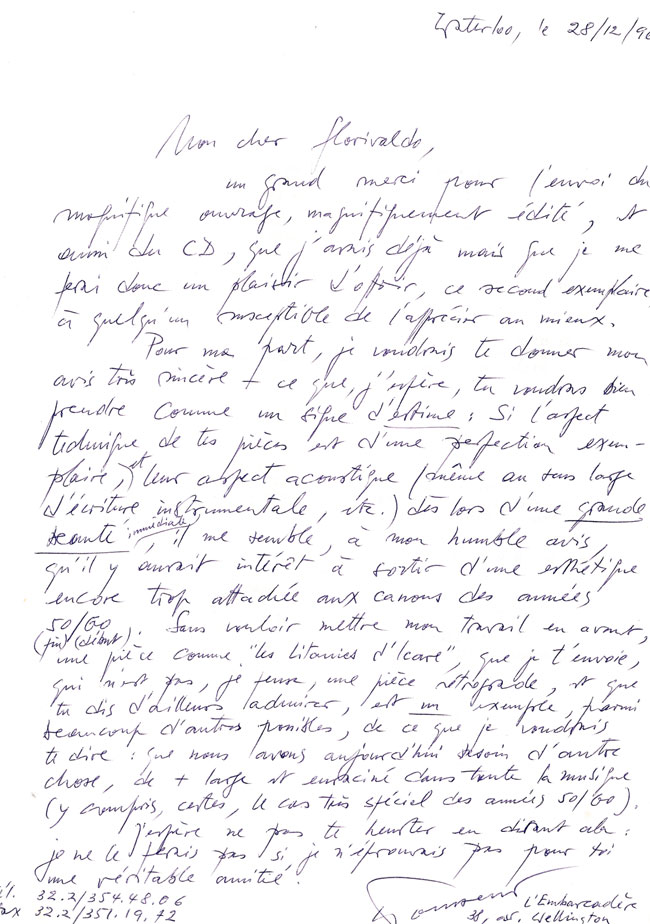
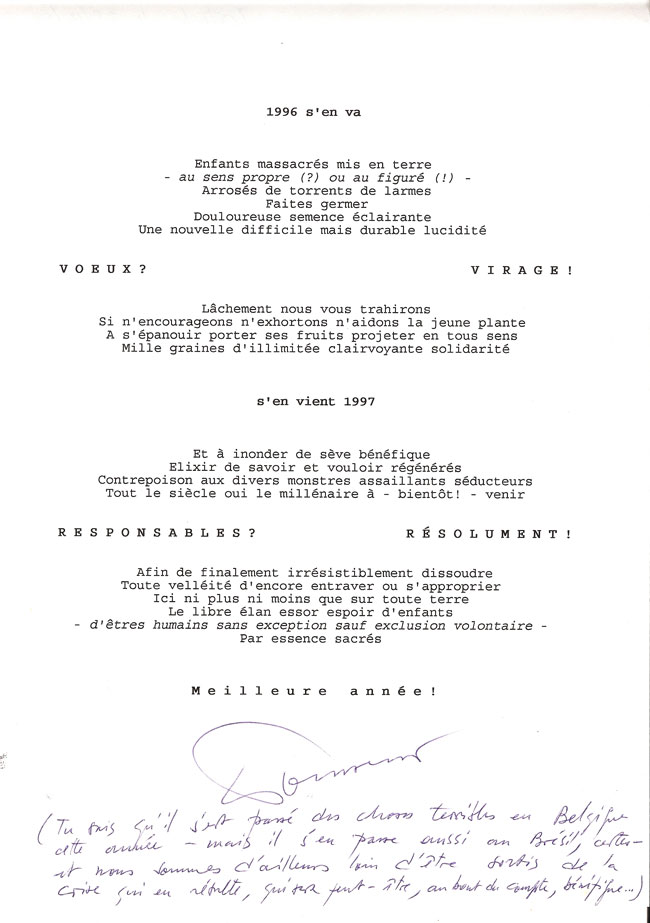
My answer from 29 December 1998 to this letter of Pousseur:
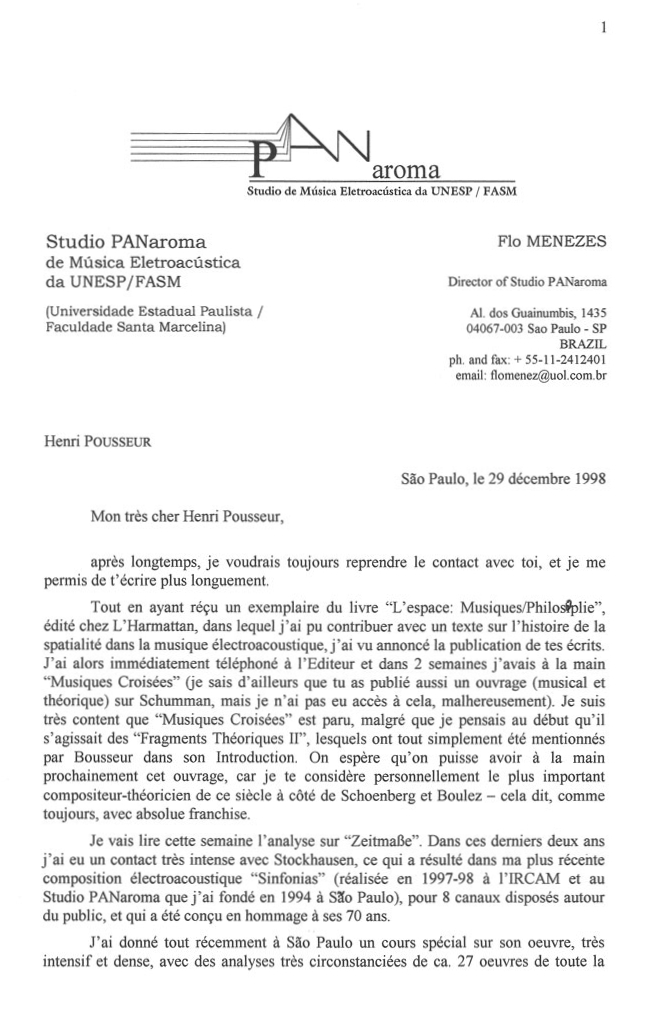
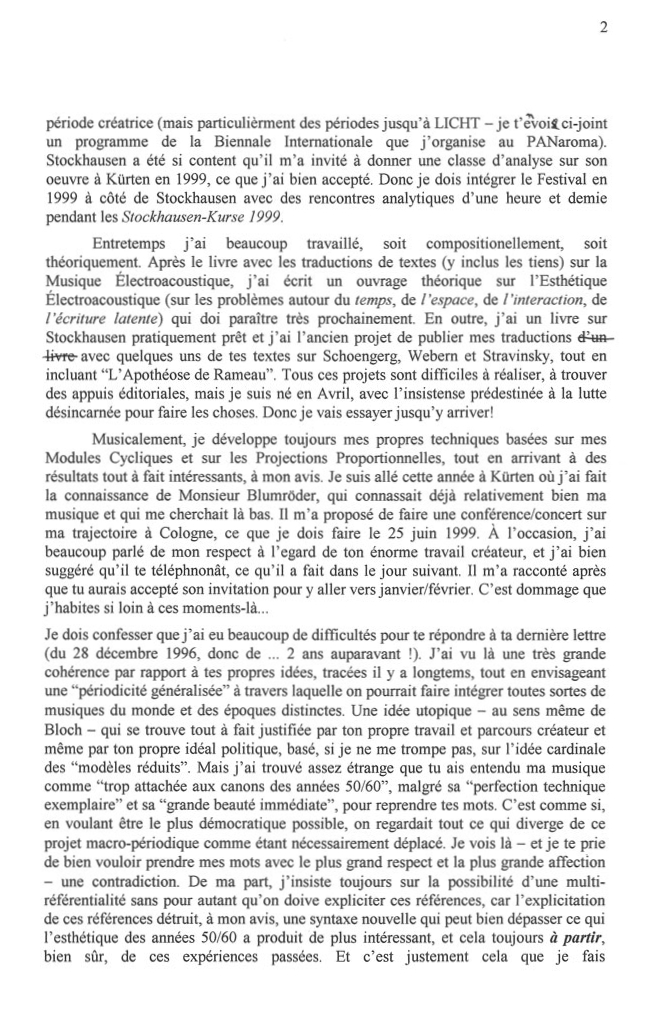
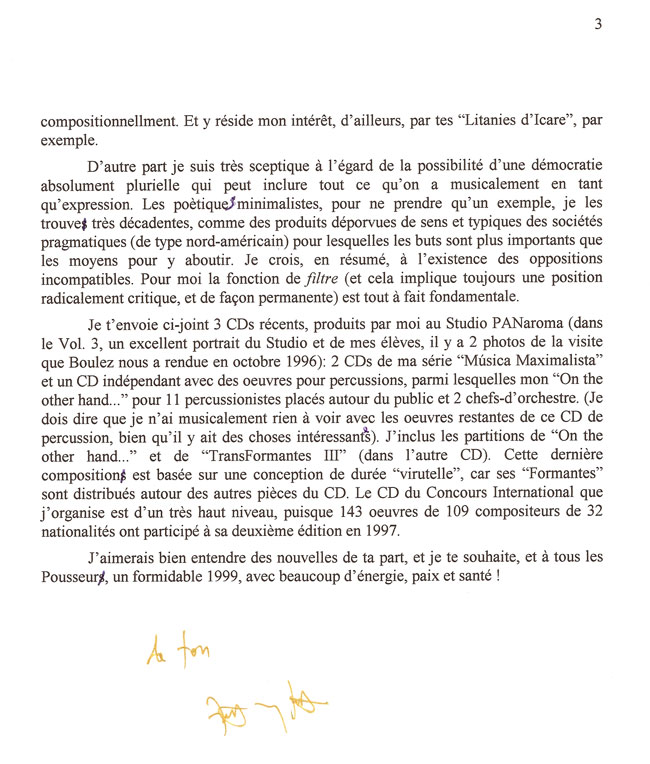
Pierre Boulez
On 31 March 1993 Boulez wrote me telling me about his interest on my theoretical writings on Berio:
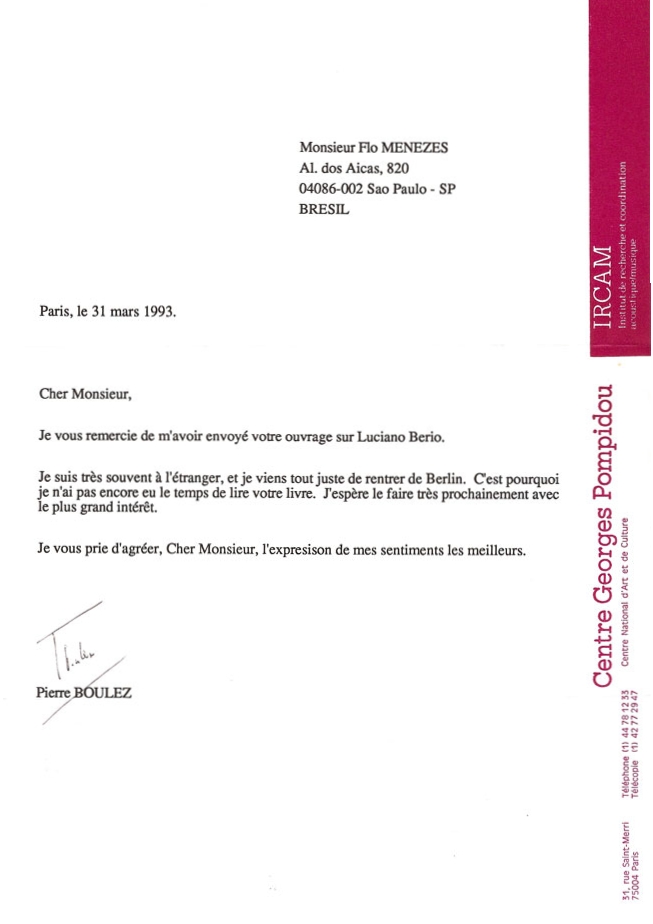
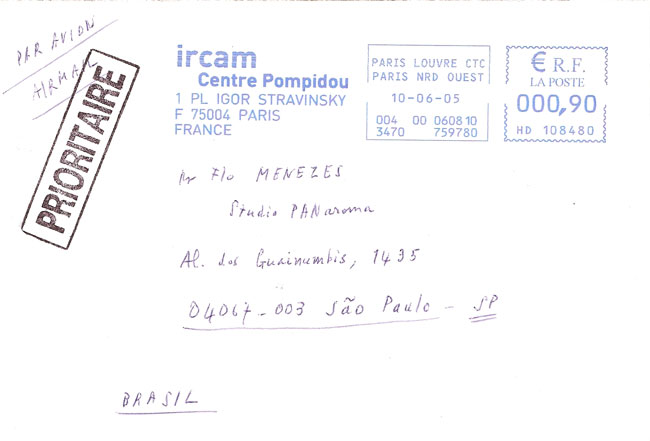

On 9 June 2005 Boulez wrote me an extremely interesting letter. I discovered at that time a "law of symmetry" in his multiplication technique and wrote him about that, asking him if he conscientiously worked this law. He did not answer directly to my question, referred himself to the world première of my Pulsares in the inaugural month of the Walt Disney Hall in Los Angeles, when he conducted Wagner at the big concert hall, and limited himself to describe his interest on symmetrical constitutions (see my transcription below):
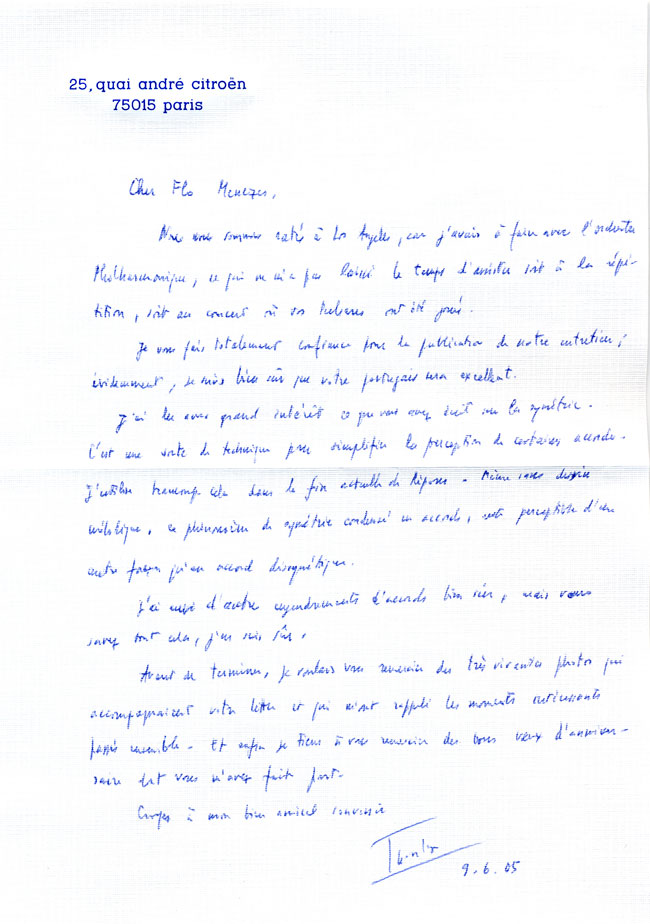
Due to the extreme difficulty to understand Boulez' handwriting, it follows now the transcription of this letter:
"Cher Flo Menezes,
Nous nous sommes ratés à Los Angeles, car j’avais à faire avec l’orchestre Philharmonique, ce qui ne m’a pas laissé le temps d’assister soit à la répétition, soit au concert où vos Pulsares ont été joués.
Je vous fais totalement confiance pour la publication de notre entretien: évidemment, je suis bien sûr que votre portugais sera excellent.
J’ai lu avec grand intérêt ce que vous avez écrit sur la symétrie. C’est une sorte de technique pour simplifier la perception de certains accords. J’utilise beaucoup cela dans la fin actuelle de Répons. Même sans dessin mélodique, ce phénomène de symétrie condensé en accords, reste perceptible d’une autre façon qu’en accord désymétrique.
J’ai aussi d’autres engendrements d’accords bien sûr, mais vous savez tout cela, j’en suis sûr.
Avant de terminer, je voulais vous remercier des très vivantes photos qui accompagnaient votre lettre et qui m’ont rappelé les moments intéressants passés ensemble. Et enfin je tiens à remercier des bons vœux d’anniversaire dont vous n’avez pas fait part.
Croyez à mon bien amical souvenir
P boulez
9.6.05"